
- Greta Solsaa
- Kate Blofson of Born to Swarm Apiaries
Kate Blofson loves springtime because she returns to days spent amid her reawakened swarm of bees.
"It's just an awesome experience to be surrounded by tens of thousands of bees swirling around you," said Blofson, 46, owner of Born to Swarm Apiaries in Jericho.
Off the winding dirt road where Blofson keeps her hives, bees recently spiraled through the warming air, touching down on maple buds and pussy willows, collecting nectar from the first blossoms of the season.
Blofson first dabbled in the art of beekeeping on a friend's urban farm in Philadelphia. In 2011, her desire to work in nature brought her to Vermont, where she completed a master's degree in natural resources at the University of Vermont. During that time, she took a job catching queen bees to raise and sell to people looking to start their own hives.
In spring 2022, Blofson acquired a hive of her own and established an apiary next to her neighbors at Bone Mountain Farm, a vegetable operation for which she also works. She is collaborating with the farmers on research investigating the impact of thyme on bees' health and productivity.
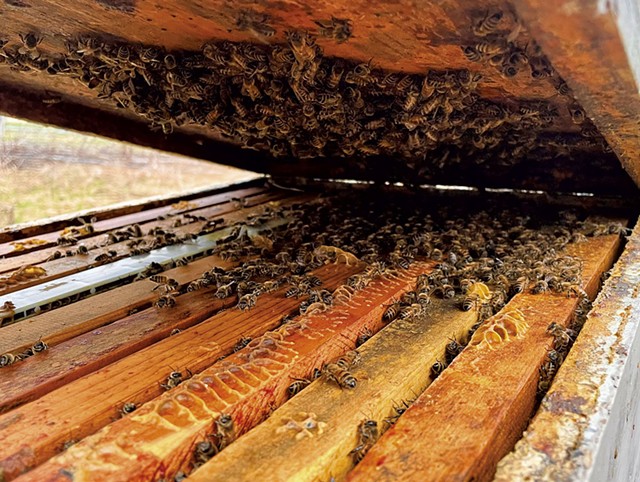
- Greta Solsaa
- Bees in a hive at Born to Swarm Apiaries
With the farm's abundant herbs, Blofson makes thyme- and lavender-infused honey. She also sells pure honey. The beekeeper said she can tell which blooms the bees have been frequenting based on the resulting honey: Goldenrod honey tastes like butterscotch, and basswood honey tastes minty.
Blofson started selling Born to Swarm honey, honeycomb and beeswax candles at the Tuesday farmers market in Burlington's Old North End. Her products can also be purchased through Miss Weinerz online, Railyard Apothecary in Burlington and Misery Loves Company in Winooski.
As her bees buzzed about her, Blofson chatted with Seven Days about the power of honey and bees and why she loves beekeeping.
Honey is tasty, but are there any other benefits to consuming it or anything else bees produce?
I really believe in the power of honey, as well as the bees, for healing. I think people are curious about nature, and bees are a great way to learn about and to connect with nature and its flow.
Honey is one of the oldest medicines in the world. [It] is incredibly helpful for a variety of ailments and has been used across cultures and centuries. It's great for cuts and for colds. Propolis, another hive product that the bees make from tree resin, is antibacterial and antiviral. Candles [made] with beeswax produce this beautiful scent to clean the air.
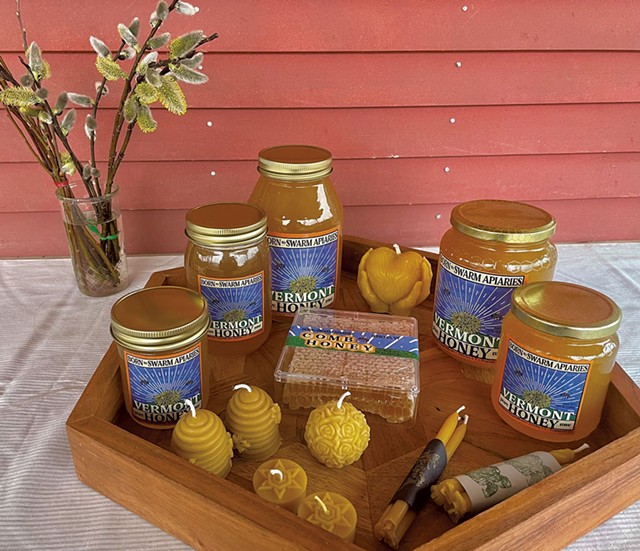
- Greta Solsaa
- Honey products by Born to Swarm Apiaries
We have all heard the call to save the bees. What is the value of pollinators, and why are bee populations on the decline?
Our pollinators have a huge importance agriculturally. We rely on [them] for our food and pollinating our crops. Bees pollinate more than 130 types of fruits and vegetables like pumpkins, blueberries [and] apples.
One major factor affecting the health of honeybees could be the use of pesticides, including neonicotinoid pesticides. Those are shown to have — even at really small levels — a lot of impacts on the bees in terms of their foraging ability, their development, how long they live, how productive they are. Bees have been suffering over the past 10 years as the use of these pesticides has ramped up.
Another big factor are these pests called varroa mites, which transmit a variety of viruses. Those have been super decimating for the bees. All of these interacting factors lead to a decline in the hive.
What lessons have you learned from the bees?
Beekeeping is always an adventure. It's a good lesson on what you can and can't control, as well as nature's endless capacity to produce surprise and wonder.
I think bees span the wild and the domestic in this really wonderful and interesting way. You're just so tied to the weather and the seasons and the floral blooms, so you're in touch with the land in a different way that's very beautiful.
The hive is such a mystery. The more you know about it, the more the mystery is revealed and starts to make sense. A master beekeeper seems almost like a magician. They can look at the front of a hive and know so much just from the way the bees are going in, what they're bringing in and what they're doing at the entrance. It's just a really neat little ecosystem that's connected very intimately to this larger ecosystem.
This interview was edited and condensed for clarity and length.

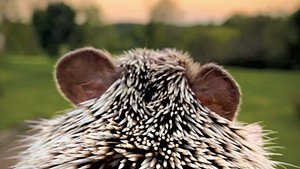
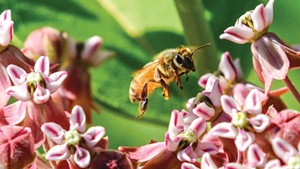
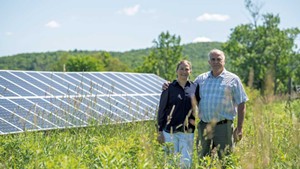









Comments
Comments are closed.
From 2014-2020, Seven Days allowed readers to comment on all stories posted on our website. While we've appreciated the suggestions and insights, right now Seven Days is prioritizing our core mission — producing high-quality, responsible local journalism — over moderating online debates between readers.
To criticize, correct or praise our reporting, please send us a letter to the editor or send us a tip. We’ll check it out and report the results.
Online comments may return when we have better tech tools for managing them. Thanks for reading.